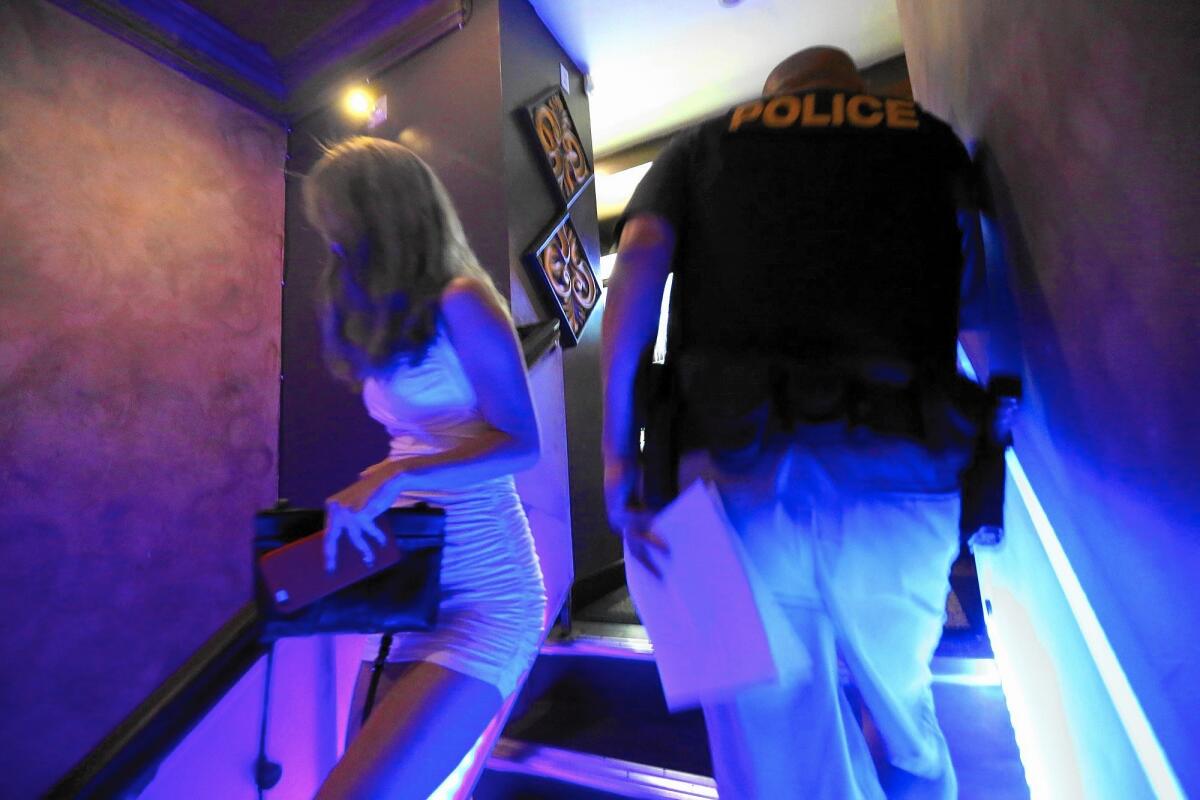Reporter’s Notebook: How LAPD vice is cleaning up K-town’s less savory side

An agent with the Department of Alcoholic Beverage Control walks past a “doumi girl” while looking for infractions and code violations at Club Skai in Koreatown in October.
- Share via
“Here’s a couple,” the sergeant says, motioning toward two young women shuffling past with doll-like makeup, perfectly coiffed hair and dresses clinging tightly to their petite frames.
There’s another scurrying into the club in a black corset dress with a lace-up front, then another, in a dusty-rose number.
They’re “doumi” girls, Los Angeles Police Sgt. Julia Vincent tells me.
I think: Really?
Sure, that one’s wearing clear plastic stripper sandals. But I have a dusty-rose dress that looks just like the one another’s wearing. Couldn’t they just as easily be meeting up with friends?
Korean karaokes — called nore bang, or “singing rooms” — have been a part of my life since I was a middle schooler in Seoul, South Korea. I’d sometimes go with friends after school, still in our uniforms.
Since moving to Los Angeles eight years ago, I’ve been bringing Korean and non-Korean friends to share the joys of drinking soju and belting out Britney Spears tunes in individual rooms equipped with tambourines, disco balls and surround-sound that creates the intoxicating illusion that we’ve got better pipes than we do.
I’d been aware of for-hire party girls whom men pay $120 or more to hang out with in the karaoke bars’ private rooms — and that sometimes the lines between fake affection and prostitution can get blurry. I imagined those shadowy practices were taking place in seedy underground establishments far off my beaten path.
It took a ride-along with LAPD vice officers for me to see something I’d been missing: doumi girls are woven into Koreatown’s fabric, right there in places I’d celebrated birthdays with friends, where I’d taken my parents when they were in town.
::
My tour guides through Koreatown after dark are Vincent, the Olympic division’s vice supervisor, her boss Capt. Vito Palazzolo, and one of Vincent’s officers, who frequently works undercover.
For years, Koreatown had an “anything goes” reputation, a destination only accessible to Korean-speakers who knew the right people or the right number to call.
After-hour alcohol sales, smoking indoors and doumi girls? “It’s Koreatown, Jake,” a headline in the New York Times style section proclaimed in 2004.
Then the Los Angeles Police Department opened the Olympic division in 2009, essentially giving Koreatown a dedicated police force.
Over those six years, the Korean brand of nightlife — private-room karaoke bars, nightclubs with lavish bottle service, and 24/7 noodle and tofu stew joints — continued to gain in popularity among non-Koreans. Now the Olympic area’s 6.2 square miles has more than 400 locations selling alcohol, the highest concentration in the city.
In L.A., it’s a misdemeanor for paid companions to encourage patrons to consume alcohol, and a legal violation for the businesses that hire or allow them. Because many of the women are from South Korea and don’t have work permits, the job also flouts employment and, sometimes, immigration laws.
In recent years, though, Palazzolo has made it his mission to clean up Koreatown’s less-savory side.
At the peak of unruliness, there were almost weekly reports of sexual assault or rape from doumi girls whose customers wanted more than they were willing to provide. After the vice squad cracked down earlier this year, Palazzolo says, it’s gone down to once every few months. Since March, the Olympic division has made 25 arrests involving seven clubs.
Normally, vice officers spotting suspected doumi girls going into a club would jump out of their vehicle and barge into the club abruptly, giving employees less time to herd girls out back doors. Tonight — because Times photographer Genaro Molina and I are along for the ride — they’re doing slower-paced compliance checks.
When the pimply manager of the karaoke bar into which those young woman had been disappearing emerges from a doorway, Vincent grabs him by his wiry upper arm and pulls him aside. We’ve been through this before, she hisses through gritted teeth. Get those girls out of there.
The manager, with a helmet of hair that seems inspired by Peppermint Patty in the Peanuts comic, scratches his head like a teenage boy in trouble. Within minutes, a crowd of pouty young women stream out the bar.
Vincent was right. The four young women she pointed out and a couple of others jump into waiting sedans, including a shiny white Lexus, and disappear into the night.
::
Just how big the shadowy doumi business is in Los Angeles is difficult to know. But in a 2011 federal case filed against a Virginia man who ran a doumi business, the man told agents that about eight to nine companies each employ about eight to nine women in Annandale, Va. – which had a Korean population of 3,256 in the 2010 census.
Los Angeles has more than 100,000 Koreans and Korean Americans.
Hundreds of ads on Craigslist or Korean-language websites openly recruit “hot girls” with the promise of easy cash. “Party and Get Paid!” one says. Another boasts pay of up to $10,000 a month.
A few days after my ride-along, I respond to the email address on one of those ads.
My phone rings within minutes. The man on the other end of the line is startled to hear I’m a reporter rather than an aspiring doumi.
Refusing to give his name, he confirms that the Olympic division’s crackdown is definitely working, with supply and demand both down this year.
“I don’t like it personally, but they’re doing a good job,” he says. “But do cockroaches ever go away forever?”
He’s been earning his living from Koreatown’s nightlife for 25 years and has been running a doumi business for two years, he says, adding that operators like him do their best to keep sex and drugs out of it — strictly banning those who cross the line — because they don’t want the attention of law enforcement.
But he’s unapologetic about the trade.
“We have a 5,000-year history of drinking, singing and dancing,” he says. “For us Koreans, it’s in our DNA.”
::
Singing and drinking are definitely on the menu at the karaoke bar my ride-along crew hits next. The host greets us: “Hard liquor only. $260. OK?”
Minivans are often used to shuttle doumi girls from one karaoke to the next, and we followed one into a parking lot in Pico Union, just outside Koreatown.
It wasn’t meant to be an undercover operation — I have my pen and notebook out as we walk in, furiously taking notes like a dutiful student. But the host seems to think our odd grouping is there to belt out tunes over overpriced bottle service and shows us into a spacious room.
Vincent marches past our greeter, into another closed room by the bar where the singing is in full swing.
I don’t need her to tell me what’s going on. A half-dozen middle-aged men are in a tangle with a woman half their age. At the head of the table, a man smokes with his arm around a woman wearing a shimmery bikini top and a black miniskirt.
“My heart’s pounding out of my chest,” one man tells his companions in Korean.
In the meantime, three Alcoholic Beverage Control agents in flak jackets have also arrived, asking for the store’s liquor license.
Behind the bar, an employee, his face ashen, is on the phone with the owner.
“We got caught. The police are here,” he says in Korean.
Minutes later, the owner arrives, keys jangling at his waist.
“How many girls are working here?” Will Salao, ABC’s supervising agent in charge, demands.
“There are no girls working here.”
“How many doumi girls?” Salao barks, rolling his eyes.
“I don’t know doumi,” the owner insists.
Salao walks the hallways with the owner and points out that every window is either frosted or covered with a shoddily taped sheet of paper. It’s behind these obscured windows, after a booze-soaked night, that the “paid to party” gigs can veer into something more nefarious.
The bar, Salao tells the owner, is in violation of pretty much all but two of the conditions listed on its liquor license. He’s probably looking at a 15-day suspension.
::
Later, parked along a grassy median near a Chuck-E-Cheese, we watch minivan after minivan pull into a parking lot, each dropping off two to four young women teetering in sky-high heels.
One young woman in a red dress and another in black emerge from the back of a sedan and walk into the karaoke. The sedan lingers.
“He’s waiting to see if any of them get selected,” the captain explains. Soon, the woman in the black dress returns. She’ll be dropped off at other karaokes until she’s hired, then she’ll text the driver to let him know.
I watch, seeing Koreatown through new eyes:
The vans and tinted-window sedans circling the block.
The men who linger at street corners with Bluetooth earpieces.
What did I think was happening all these years, when I’d see the myriad double-parked cars idling in Koreatown streets, hazard lights blinking?
The next time my parents are in town, I’ll think twice before choosing a karaoke destination.
Inevitably, though, I’ll be back in those bars again to howl some ‘90s Korean boy band hits. I just won’t wear that dusty-rose dress.
ALSO
Hundreds bid goodbye at funeral for slain Downey police officer
Ex-L.A. County sheriff’s deputies sentenced to prison for beating of jail visitor
Wheelchair stolen from girl without legs is returned to family
More to Read
Sign up for Essential California
The most important California stories and recommendations in your inbox every morning.
You may occasionally receive promotional content from the Los Angeles Times.











